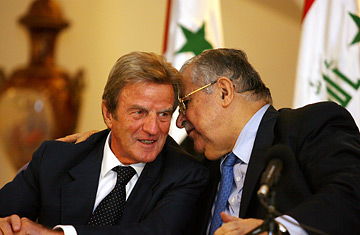
French Foreign Minister Bernard Kouchner, left, with Iraqi President Jalal Talabani, during his second day in Iraq.
Unlike some Western officials who visit Baghdad, French Foreign Minister Bernard Kouchner had no national troops to buck up when he began his surprise three-day visit Sunday. After all, Paris opposed the U.S.-led war against Saddam Hussein, with warnings of dire consequences that have mostly come to pass. So what was Kouchner's purpose in the Iraqi quagmire that most of his countrymen look to with "we told you so" dismay? In large part, to send the clear signal to Washington that France is determined to continue mending diplomatic relations that deteriorated, in large part, over Iraq.
"It has not been lost on us that the road to Washington passes through Baghdad, and we happily took note that the U.S. was the first to react to [Kouchner's] visit with praise," a French Foreign Affairs Ministry official told TIME of this first voyage to Iraq by a government official from France since the war began. However, the official also acknowledged that beyond the message sent to America about French desire to replace past conflict with diplomatic partnership on Iraq, Kouchner's visit wouldn't produce much in the way of hard results. "It's of symbolic significance," he said. "But you often open the door to concrete chance by first taking symbolic positions."
Symbolism and gesture have become staples of French President Nicolas Sarkozy since taking office three months ago, and his dispatching of Kouchner to Iraq is clearly another example. The U.S.-pleasing trip also guaranteed Sarkozy headlines his first day back on the job following a two-week vacation in New Hampshire — during which he created much media buzz with his July 12 private lunch with U.S. President George W. Bush at his family's Kennebunkport, Maine, summer home. The result was much-hyped warmth over what one Elysée official called the miracle of the two men "being able to discuss all the major international issues, and cordially agree that they don't agree on everything."
Though French Foreign Ministry officials say Kouchner's visit to Iraq was not discussed during that encounter — and arose from a visit by Iraqi President Jalal Talabani — it's evident the mission was designed to smooth over multiple diplomatic rough spots with one dramatic gesture. "Now we are turning the page; there is a new perspective," Kouchner told reporters following his arrival in Baghdad Sunday, speaking language destined as much for U.S. officials as his Iraqi hosts. "We want to talk about the future. Democracy, integrity, sovereignty, reconciliation and stopping the killings."
Kouchner's involvement gave the visit an added symbolism, considering his own views on the issue of the Iraq war. Unlike Sarkozy himself, Kouchner was one of the few leading French politicians who voiced conditional backing of the U.S.-led invasion of Iraq, arguing the removal of Saddam Hussein would strike a blow in favor of humanitarian principles. Upon becoming France's head diplomat, Kouchner listed greater French interest in Iraq as one of his priorities, alongside a more active role in conflicts in Darfur, Kosovo and Lebanon. Finally, Kouchner's visit began on the fourth anniversary of the truck bombing of the United Nation's Baghdad headquarters that killed the U.N.'s special envoy and Kouchner's personal friend, Sergio Viera de Mello, and in the wake of a recent U.N. resolution to widen its mandate in Iraq.
All of that was applauded by a Bush Administration, "This is one more example, along with the new U.N. mandate, the neighbors conference process and recent announcements by Saudi Arabia to open an embassy and forgive Saddam-era debt, of a growing international desire to help Iraq become a stable and secure country," White House spokesman Gordon Johndroe commented of Kouchner's visit.
Still, the diplomatic gesture — and improving atmosphere surrounding Franco-U.S. relations — will mean little, if anything, in terms of finding an end to the violence in Iraq. Though the French Foreign Ministry official says the visit "sends a message to the Iraqi leadership that France is ready to help find a resolution to the conflict." He reiterated French policy that "any eventual solution must be political, not military."
That'll be tough to sell to the Bush Administration, which insisted on the military adventure in Iraq in the first place; harder still to the myriad insurgent groups battling U.S.-led forces in Iraq, and prepared to use any means to advance their often mutually hostile extremist ideologies. Indeed, just hours after Kouchner's arrival signaled France's return to Iraq, a roadside bomb killed the second important Iraqi provincial official within a week, while a separate attack in a Shi'ite neighborhood of Baghdad claimed 12 lives.
Though Kouchner's presence in Iraq served multiple symbolic purposes, it's clear it doesn't signal a revised French position on wading into a conflict virtually all its leaders still think was a mistake. Indeed, the Foreign Ministry official noted there's no question of sending French forces to Iraq, while even contractors from working in the country do so against governmental advisories. In fact, the violence in Iraq is so great that authorities from France's main foreign intelligence service tell TIME their local officials have suggested pulling out until some semblance of order is restored. Though the service continued operating before and through the U.S.-led invasion — boasting probably the deepest Western intelligence operations in Iraq before the conflict — officials say chaos in the country is so great "it's virtually impossible to collect solid, coherent information, which is what we're there for."
Given the situation today, says one French intelligence official, "it looks clear U.S. forces have at least a decade ahead of themselves just to stabilize and secure Baghdad — forget about the rest of Iraq for now." Such forecasts aren't ones the Bush Administration or the U.S. public wants to hear — but they also won't be ones diplomats like Kouchner will be able to ignore now that he has taken a renewed interest in the country.
